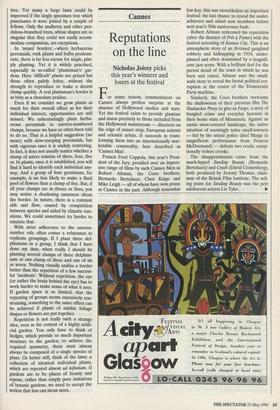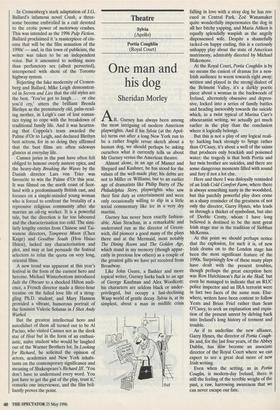Cannes
Reputations on the line
Nicholas Joicey picks this year's winners and losers at the festival
For some reason, commentators on Cannes always profess surprise at the absence of Hollywood studios and stars. Yet the festival exists to provide glamour and status precisely to those excluded from the Hollywood mainstream — directors on the edge of sunset strip, European auteurs and oriental artists. It succeeds in trans- forming them into an internationally mar- ketable commodity, best described as 'Cannes Man'.
Francis Ford Coppola, this year's Presi- dent of the Jury, presided over an impres- sive range of films by such Cannes Men as Robert Altman, the Coen brothers, Bernardo Bertolucci, Chen ICaige and Mike Leigh — all of whom have won prizes at Cannes in the past. Although somewhat low-key, this was nevertheless an important festival: the last chance to reveal the under- achievers and admit new members before next year's 50th anniversary bash.
Robert Altman redeemed his reputation (after the disaster of Pr& it Porter) with the festival screening of Kansas City. This is an atmospheric story of an ill-timed gangland robbery and kidnapping in 1934, under- pinned and often dominated by a magnifi- cent jazz score. With a brilliant feel for the period detail of the town in which he was born and raised, Altman uses the small- scale story to reveal the brutal political cor- ruption at the centre of the Democratic Party machine.
Similarly, the Coen brothers overcame the shallowness of their previous film The Hudsucker Proxy to give us Fargo, a story of bungled crime and everyday heroism in their home state of Minnesota. Against an exotic snow-covered landscape, the native intuition of seemingly naïve small-towners — led by the astute police chief Marge (a magnificent performance from Frances McDormand) — defeats two crude, excep- tionally violent crooks.
The disappointments came from the much-hyped Stealing Beauty (Bernardo Bertolucci) and Crash (David Cronenberg), both produced by Jeremy Thomas, chair- man of the British Film Institute. The sell- ing point for Stealing Beauty was the pert adolescent actress Liv Tyler. 110. In Cronenberg's stark adaptation of J.G. Ballard's infamous novel Crash, a three- some become embroiled in a cult devoted to the erotic power of motorway crashes. This was intended as the 1996 Pulp Fiction. Ballard proclaimed it 'a masterpiece of cin- ema that will be the film sensation of the 1990s' — and, in this town of publicists, the writer was taken to be an independent voice. But it amounted to nothing more than perfunctory sex (albeit perverted), interspersed with shots of the Toronto highway system.
Rejecting the fake modernity of Cronen- berg and Ballard, Mike Leigh demonstrat- ed in Secrets and Lies that the old styles are the best. 'You've got to laugh ... or else you'd cry,' utters the brilliant Brenda Blethyn as the prematurely old, palm-read- ing mother, in Leigh's cast of lost roman- tics trying to cope with the breakdown of traditional family life. And it was hearten- ing that Coppola's team awarded the Palme d'Or to Leigh, and declared Blethyn best actress, for in so doing they affirmed that the best films are often sideways glances at everyday life.
Cannes juries in the past have often felt obliged to honour overly austere epics, and the heavy-duty Breaking the Waves by the Danish director Lam von Trier was favourite to win the Palme d'Or this year. It was filmed on the north coast of Scot- land with a predominantly British cast, and focuses on a simple-minded young woman who is forced to confront the brutality of a repressive religious community after she marries an oil-rig worker. It is a powerful tale, but the direction is far too laboured and the characterisation too cold. The simi- larly lengthy entries from Chinese and Tai- wanese directors, Temptress Moon (Chen Kaige) and Goodbye South (Hou Hsiao Hsien), lacked any characterisation and plot, and may at last persuade the festival selectors to relax the quota on very long, oriental films.
A new trend was apparent at this year's festival in the form of the earnest hero and heroine. Michael Winterbottom introduced Jude the Obscure to a shocked Hilton audi- ence, a French director made a three-hour treatise on the failed love life of a strug- gling Ph.D. student, and Mary Hannon provided a vibrant, humorous portrait of the feminist Valerie Solanas in I Shot Andy Warhol.
But the greatest intellectual hero and autodidact of them all turned out to be Al Pacino, who visited Cannes not as the sleek star of Heat but in the form of an enthusi- astic, naive student who would be laughed out of the Warner Brothers lot. In Looking for Richard, he solicited the opinion of actors, academics and New York inhabi- tants on the contemporary significance and meaning of Shakespeare's Richard III. 'You don't have to understand every word. You just have to get the gist of the play, trust it,' remarks one interviewee, and the film bril- liantly proves the point.



























































 Previous page
Previous page